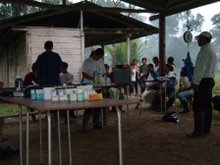It’s been awhile since my last writing and it will probably be awhile more before I’m in that thinking frame of mind again. But there have been so many poignant moments so far in residency that each one deserves its time to be savored. It is for me as true as ever that medicine is a labor of love for the beautiful rawness of humanity.
As the intern, lowest of the low and even more so because it’s surgery residency, for me to be in the operating room is no small feat. Even if all I’m doing is removing a catheter (the procedure takes five minutes tops), I’ll take it. The other day, we had three such cases scheduled. Having become nonchalant about these “surgeries”, I was somewhat annoyed—after you yank the catheter out, you have to hold tight pressure at the neck so the punctured vessel can clot off. For fifteen minutes. In fifteen minutes, I could complete 5 other necessary tasks! Instead, I’d be pressing on a neck in a sterile field for a total of 45 minutes. What a waste of time.
The first case was an elderly African American lady wearing a grey sweatsuit and shiny crocodile shoes. After completing all the preoperative paperwork, I positioned, cleaned and draped her neck to make sure the field was sterile, and called my attending before injecting the lidocaine and starting the dissection. The catheter came out easily. The attending left swiftly, and I was left sweating in my mask under the bright lights, holding pressure. Five minutes went by in silence. The OR nurse, Jean, asked me what dressings I wanted. They were retrieved. The patient lay quietly, patiently awaiting her reprieve. The fifteen minutes finally ended and I checked for hemostasis, placing a neat pressure dressing on her wrinkly neck. Jean and I transferred her from the table to a wheelchair while she muttered about wanting tea and pancakes. Then I ran off to complete other tasks before the next case.
The next patient was another elderly man with a heavy Caribbean accent. He was with his wife, who was sleeping next to him in the holding room. He had a good-natured disposition and a long grey beard that ended in a sharp point. I did his paperwork and interrogated him at rapid pace to make sure his blood pressure was controlled (it wasn’t), that he was not on a blood thinner (he was), and that if he was on a blood thinner that he knew why (he didn’t) and his most recent INR (ditto). I wanted to get this done as soon as possible. The attending didn’t answer my phone so I called another attending on service, who agreed to supervise. We waited ten minutes. The attending finally showed up. The case went the same, with the exception of the patient needing extra lidocaine for the pain.
When the catheter came out, I braced myself for another fifteen minutes of emptiness. I wanted to take my mask and sterile gloves off and pull my phone out for entertainment, but that would violate our sterile field. To my surprise, the patient broke the silence. “Ah, what I wouldn’t give for some fish and grits right now,” he said. My eyes, previously glued to the clock, turned to the wispy tufts of hair on his chin. I didn’t like grits at all. The OR tech laughed and chimed in, “It’s always a good time for fish and grits!” They shared a slow and hearty chuckle. “Ya, it is,” my patient said. “I got a granddaughter who live across the street. I make her fish and grits every day and she call me Papi and don’t let no one else call me that.” I asked him how he makes fish. “Well, I had one of the dialysis nurses at me house the other day. She said she never had such good fish. You got to steam it in lemon juice with some dry onion and cumin and butter. If you do it right, ain’t nothing better.” We all shook our heads, imagining a perfectly steamed fish. Our time was up and I put the dressing on. We helped Papi up from the table. “I want a hot coppa tea,” he sighed.
I signed his paperwork and walked back to the floors, back to checking boxes off my to-do list. It was a slower walk and I felt more human. I had been transported into my patient’s world for a few moments, a world that was abstract and foreign to me, but real and wonderful to him. Holding pressure was the perfect time to step into his life outside his disease, with no responsibilities other than mechanically achieving hemostasis. Hard to remember in a field where you are always under pressure, but so worth remembering.
My dad always taught me that there are many ways of seeing the same thing, and it’s up to each person to see what’s in front of them in the correct way—the correct way being the way that is most beneficial to you and everyone around you. Residency is tough: there are rude people, unfair hierarchies, rough hours and inequalities. But medicine is a privilege: we are privy to everything in a person’s life for a critical slice of time. To isolate the body and ignore the human in front of us would not only do a disservice to the patient, but cheat us of the best part of this profession: its humanity.
Thursday, December 1, 2011
Subscribe to:
Posts (Atom)




